Analysis of Values and Principles in Australian Community Work
VerifiedAdded on 2020/10/22
|6
|1514
|60
Essay
AI Summary
This essay provides a comprehensive overview of the values and principles underpinning community work in Australia, with a particular focus on social inclusion. It defines social inclusion, highlighting its importance in promoting justice and equality within the Australian context. The essay delves into the historical events that have shaped the principle of social inclusion, illustrating its evolution and impact on areas such as employment, education, and social participation. It further examines the current ethical and legislative requirements related to social inclusion, including the importance of ethical conduct, non-discrimination, and providing equal opportunities. The essay also discusses the role of education and training in enhancing individual capabilities and the significance of engaging individuals in social, civic, and economic activities to foster a cohesive and inclusive society. The conclusion summarizes the key findings, emphasizing the role of social inclusion in ensuring fair treatment, equal opportunities, and the eradication of discrimination within the Australian community.
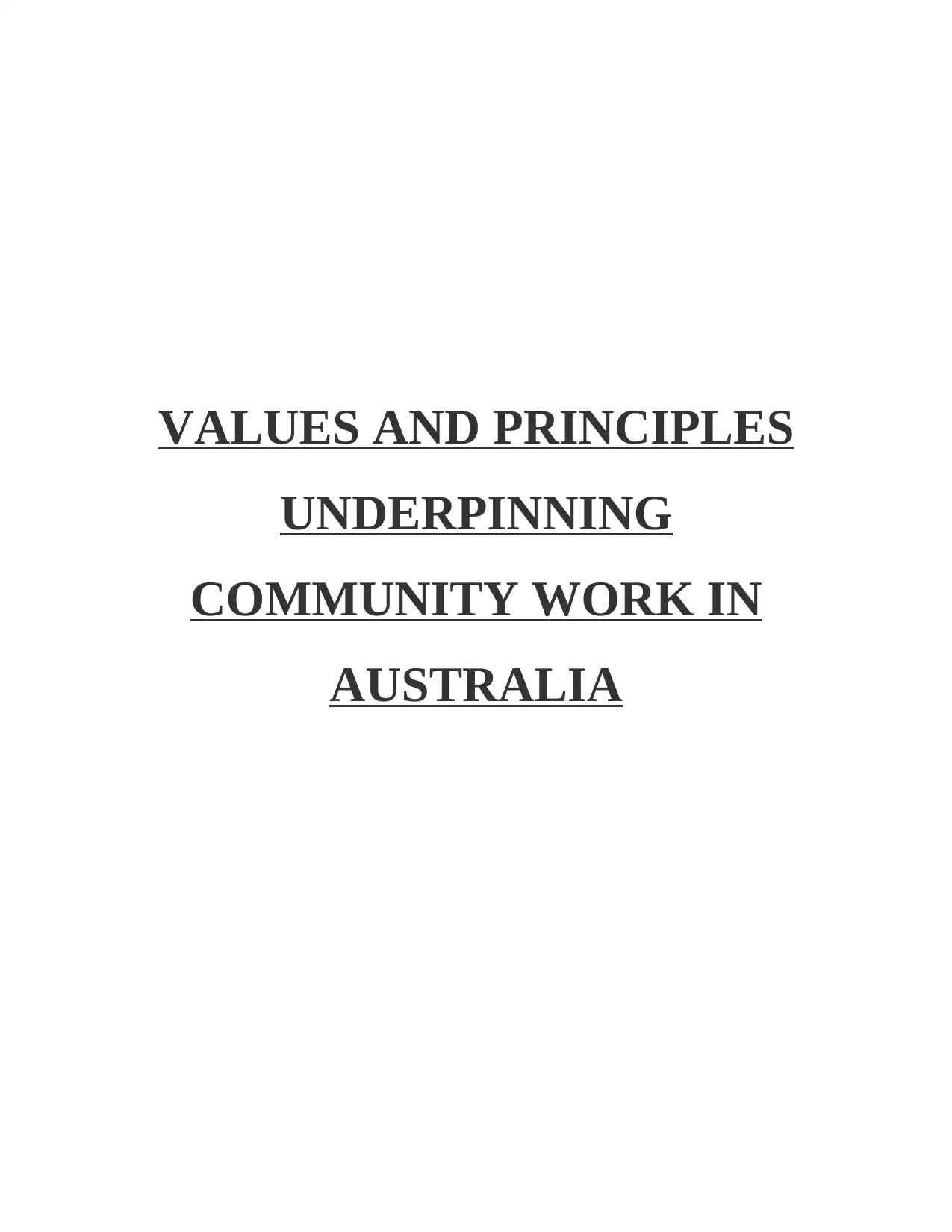
VALUES AND PRINCIPLES
UNDERPINNING
COMMUNITY WORK IN
AUSTRALIA
UNDERPINNING
COMMUNITY WORK IN
AUSTRALIA
Paraphrase This Document
Need a fresh take? Get an instant paraphrase of this document with our AI Paraphraser
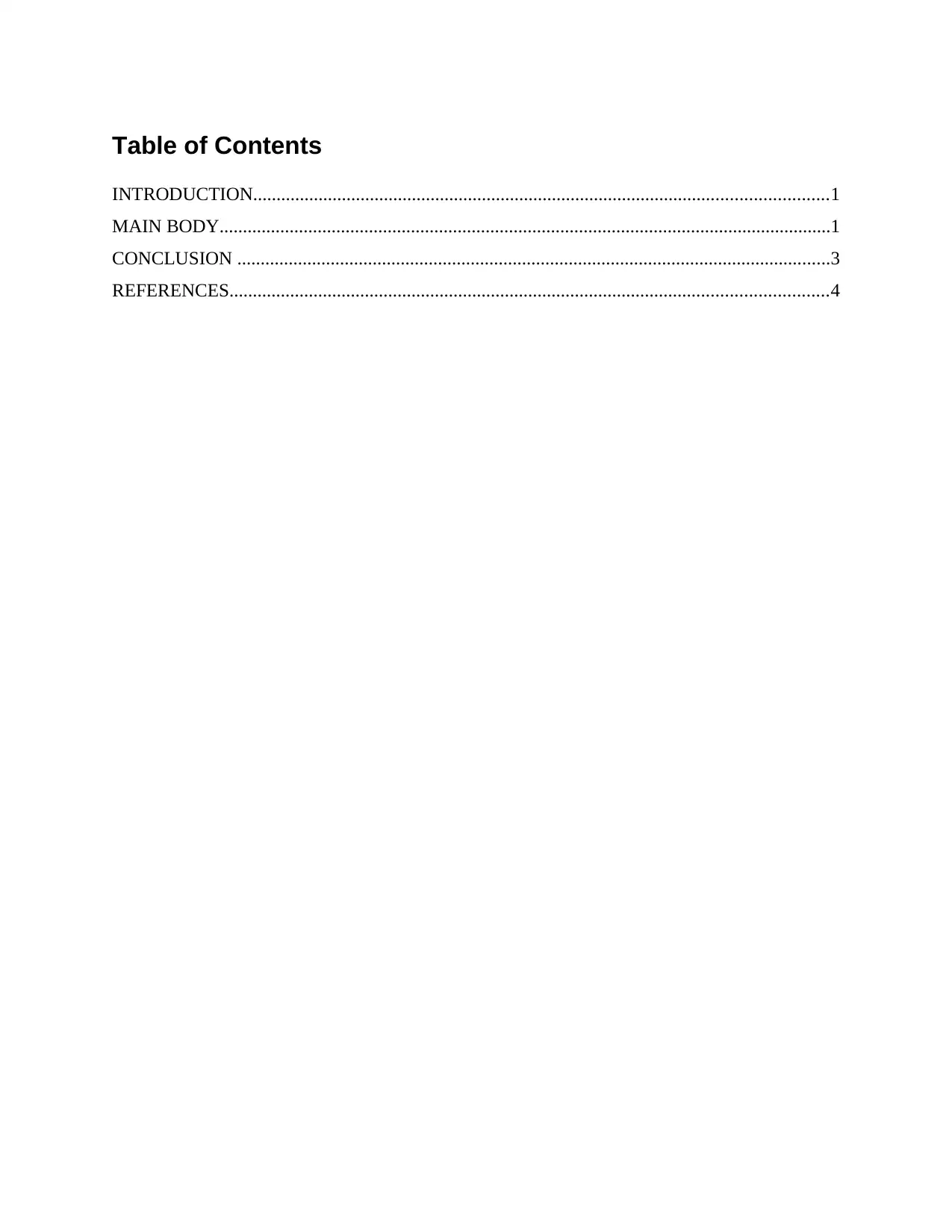
Table of Contents
INTRODUCTION...........................................................................................................................1
MAIN BODY...................................................................................................................................1
CONCLUSION ...............................................................................................................................3
REFERENCES................................................................................................................................4
INTRODUCTION...........................................................................................................................1
MAIN BODY...................................................................................................................................1
CONCLUSION ...............................................................................................................................3
REFERENCES................................................................................................................................4
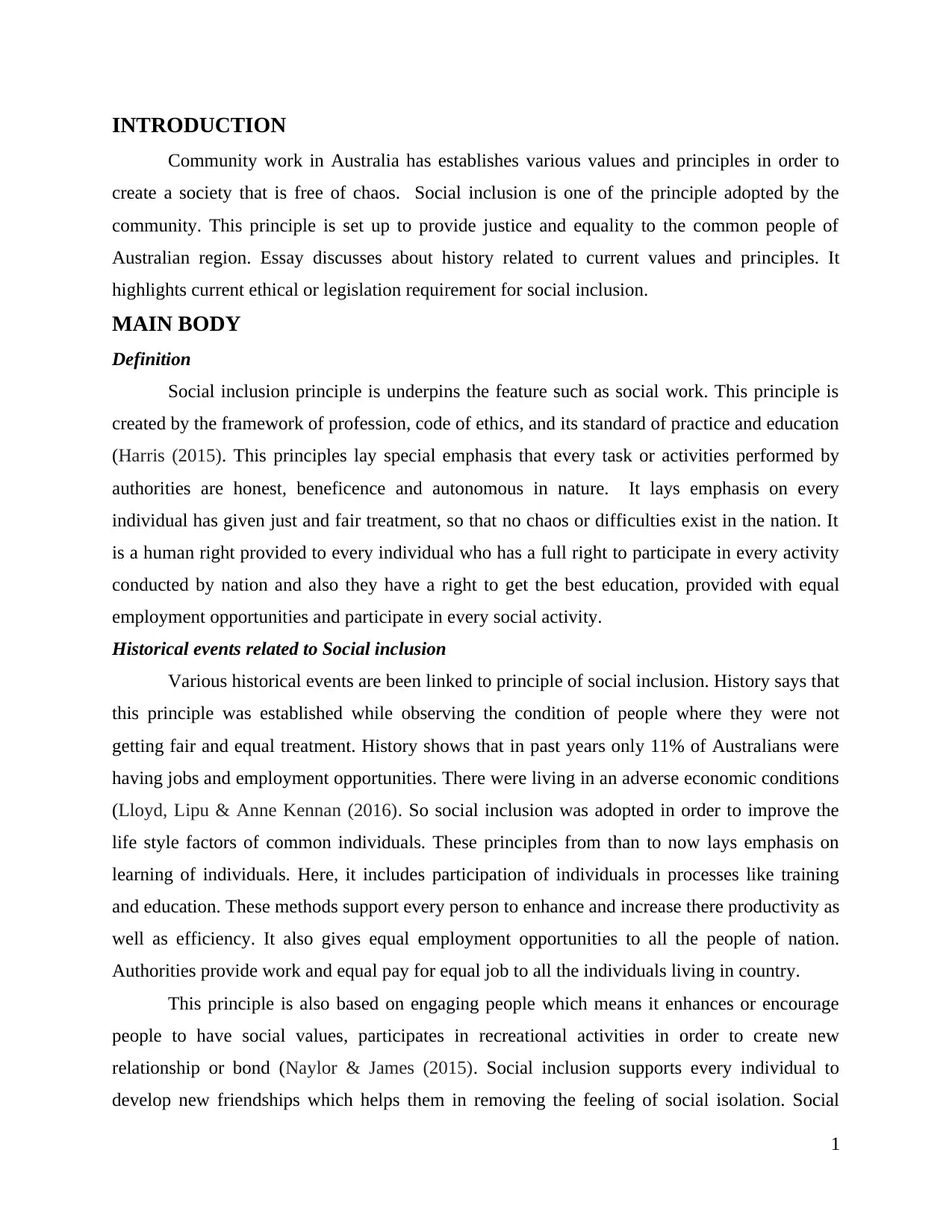
INTRODUCTION
Community work in Australia has establishes various values and principles in order to
create a society that is free of chaos. Social inclusion is one of the principle adopted by the
community. This principle is set up to provide justice and equality to the common people of
Australian region. Essay discusses about history related to current values and principles. It
highlights current ethical or legislation requirement for social inclusion.
MAIN BODY
Definition
Social inclusion principle is underpins the feature such as social work. This principle is
created by the framework of profession, code of ethics, and its standard of practice and education
(Harris (2015). This principles lay special emphasis that every task or activities performed by
authorities are honest, beneficence and autonomous in nature. It lays emphasis on every
individual has given just and fair treatment, so that no chaos or difficulties exist in the nation. It
is a human right provided to every individual who has a full right to participate in every activity
conducted by nation and also they have a right to get the best education, provided with equal
employment opportunities and participate in every social activity.
Historical events related to Social inclusion
Various historical events are been linked to principle of social inclusion. History says that
this principle was established while observing the condition of people where they were not
getting fair and equal treatment. History shows that in past years only 11% of Australians were
having jobs and employment opportunities. There were living in an adverse economic conditions
(Lloyd, Lipu & Anne Kennan (2016). So social inclusion was adopted in order to improve the
life style factors of common individuals. These principles from than to now lays emphasis on
learning of individuals. Here, it includes participation of individuals in processes like training
and education. These methods support every person to enhance and increase there productivity as
well as efficiency. It also gives equal employment opportunities to all the people of nation.
Authorities provide work and equal pay for equal job to all the individuals living in country.
This principle is also based on engaging people which means it enhances or encourage
people to have social values, participates in recreational activities in order to create new
relationship or bond (Naylor & James (2015). Social inclusion supports every individual to
develop new friendships which helps them in removing the feeling of social isolation. Social
1
Community work in Australia has establishes various values and principles in order to
create a society that is free of chaos. Social inclusion is one of the principle adopted by the
community. This principle is set up to provide justice and equality to the common people of
Australian region. Essay discusses about history related to current values and principles. It
highlights current ethical or legislation requirement for social inclusion.
MAIN BODY
Definition
Social inclusion principle is underpins the feature such as social work. This principle is
created by the framework of profession, code of ethics, and its standard of practice and education
(Harris (2015). This principles lay special emphasis that every task or activities performed by
authorities are honest, beneficence and autonomous in nature. It lays emphasis on every
individual has given just and fair treatment, so that no chaos or difficulties exist in the nation. It
is a human right provided to every individual who has a full right to participate in every activity
conducted by nation and also they have a right to get the best education, provided with equal
employment opportunities and participate in every social activity.
Historical events related to Social inclusion
Various historical events are been linked to principle of social inclusion. History says that
this principle was established while observing the condition of people where they were not
getting fair and equal treatment. History shows that in past years only 11% of Australians were
having jobs and employment opportunities. There were living in an adverse economic conditions
(Lloyd, Lipu & Anne Kennan (2016). So social inclusion was adopted in order to improve the
life style factors of common individuals. These principles from than to now lays emphasis on
learning of individuals. Here, it includes participation of individuals in processes like training
and education. These methods support every person to enhance and increase there productivity as
well as efficiency. It also gives equal employment opportunities to all the people of nation.
Authorities provide work and equal pay for equal job to all the individuals living in country.
This principle is also based on engaging people which means it enhances or encourage
people to have social values, participates in recreational activities in order to create new
relationship or bond (Naylor & James (2015). Social inclusion supports every individual to
develop new friendships which helps them in removing the feeling of social isolation. Social
1
⊘ This is a preview!⊘
Do you want full access?
Subscribe today to unlock all pages.

Trusted by 1+ million students worldwide
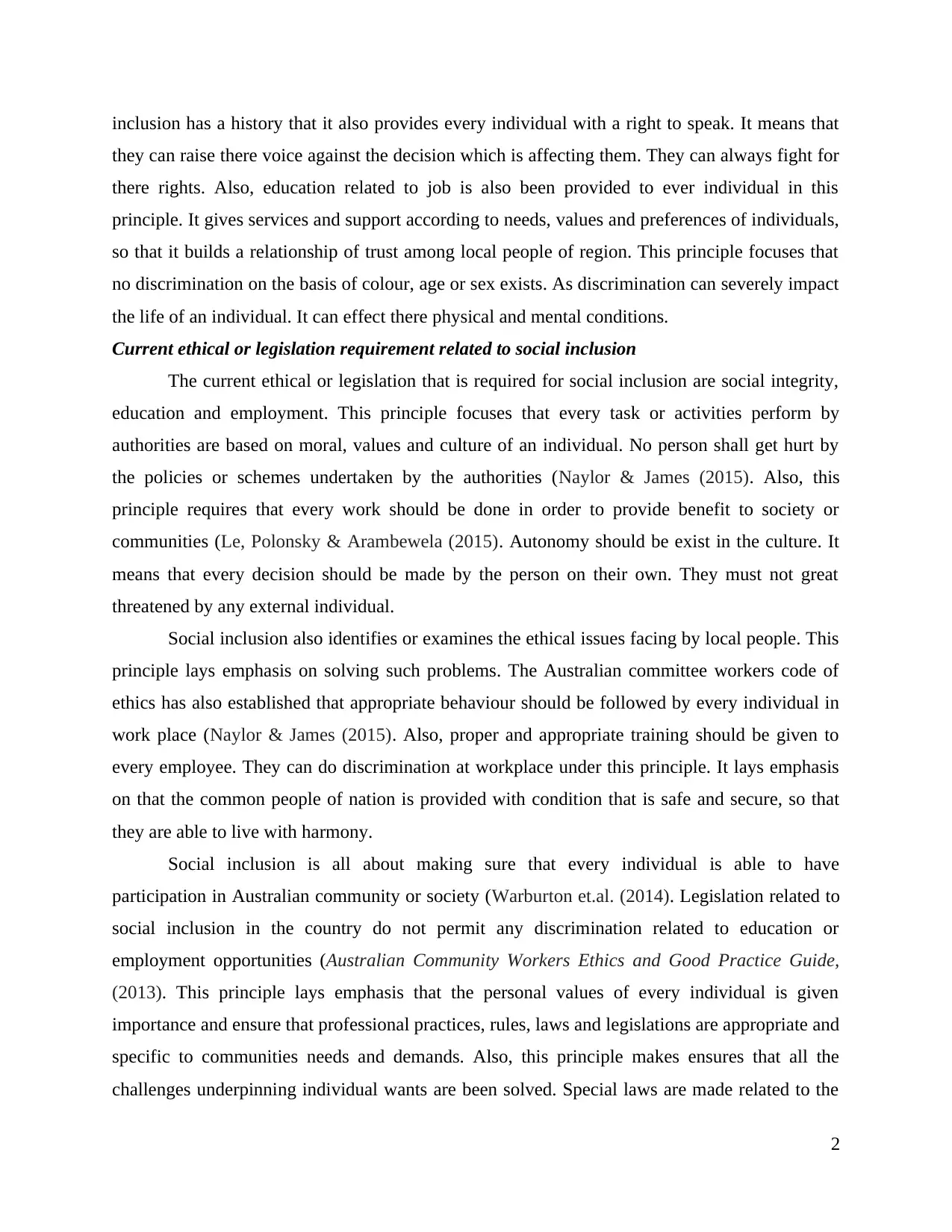
inclusion has a history that it also provides every individual with a right to speak. It means that
they can raise there voice against the decision which is affecting them. They can always fight for
there rights. Also, education related to job is also been provided to ever individual in this
principle. It gives services and support according to needs, values and preferences of individuals,
so that it builds a relationship of trust among local people of region. This principle focuses that
no discrimination on the basis of colour, age or sex exists. As discrimination can severely impact
the life of an individual. It can effect there physical and mental conditions.
Current ethical or legislation requirement related to social inclusion
The current ethical or legislation that is required for social inclusion are social integrity,
education and employment. This principle focuses that every task or activities perform by
authorities are based on moral, values and culture of an individual. No person shall get hurt by
the policies or schemes undertaken by the authorities (Naylor & James (2015). Also, this
principle requires that every work should be done in order to provide benefit to society or
communities (Le, Polonsky & Arambewela (2015). Autonomy should be exist in the culture. It
means that every decision should be made by the person on their own. They must not great
threatened by any external individual.
Social inclusion also identifies or examines the ethical issues facing by local people. This
principle lays emphasis on solving such problems. The Australian committee workers code of
ethics has also established that appropriate behaviour should be followed by every individual in
work place (Naylor & James (2015). Also, proper and appropriate training should be given to
every employee. They can do discrimination at workplace under this principle. It lays emphasis
on that the common people of nation is provided with condition that is safe and secure, so that
they are able to live with harmony.
Social inclusion is all about making sure that every individual is able to have
participation in Australian community or society (Warburton et.al. (2014). Legislation related to
social inclusion in the country do not permit any discrimination related to education or
employment opportunities (Australian Community Workers Ethics and Good Practice Guide,
(2013). This principle lays emphasis that the personal values of every individual is given
importance and ensure that professional practices, rules, laws and legislations are appropriate and
specific to communities needs and demands. Also, this principle makes ensures that all the
challenges underpinning individual wants are been solved. Special laws are made related to the
2
they can raise there voice against the decision which is affecting them. They can always fight for
there rights. Also, education related to job is also been provided to ever individual in this
principle. It gives services and support according to needs, values and preferences of individuals,
so that it builds a relationship of trust among local people of region. This principle focuses that
no discrimination on the basis of colour, age or sex exists. As discrimination can severely impact
the life of an individual. It can effect there physical and mental conditions.
Current ethical or legislation requirement related to social inclusion
The current ethical or legislation that is required for social inclusion are social integrity,
education and employment. This principle focuses that every task or activities perform by
authorities are based on moral, values and culture of an individual. No person shall get hurt by
the policies or schemes undertaken by the authorities (Naylor & James (2015). Also, this
principle requires that every work should be done in order to provide benefit to society or
communities (Le, Polonsky & Arambewela (2015). Autonomy should be exist in the culture. It
means that every decision should be made by the person on their own. They must not great
threatened by any external individual.
Social inclusion also identifies or examines the ethical issues facing by local people. This
principle lays emphasis on solving such problems. The Australian committee workers code of
ethics has also established that appropriate behaviour should be followed by every individual in
work place (Naylor & James (2015). Also, proper and appropriate training should be given to
every employee. They can do discrimination at workplace under this principle. It lays emphasis
on that the common people of nation is provided with condition that is safe and secure, so that
they are able to live with harmony.
Social inclusion is all about making sure that every individual is able to have
participation in Australian community or society (Warburton et.al. (2014). Legislation related to
social inclusion in the country do not permit any discrimination related to education or
employment opportunities (Australian Community Workers Ethics and Good Practice Guide,
(2013). This principle lays emphasis that the personal values of every individual is given
importance and ensure that professional practices, rules, laws and legislations are appropriate and
specific to communities needs and demands. Also, this principle makes ensures that all the
challenges underpinning individual wants are been solved. Special laws are made related to the
2
Paraphrase This Document
Need a fresh take? Get an instant paraphrase of this document with our AI Paraphraser
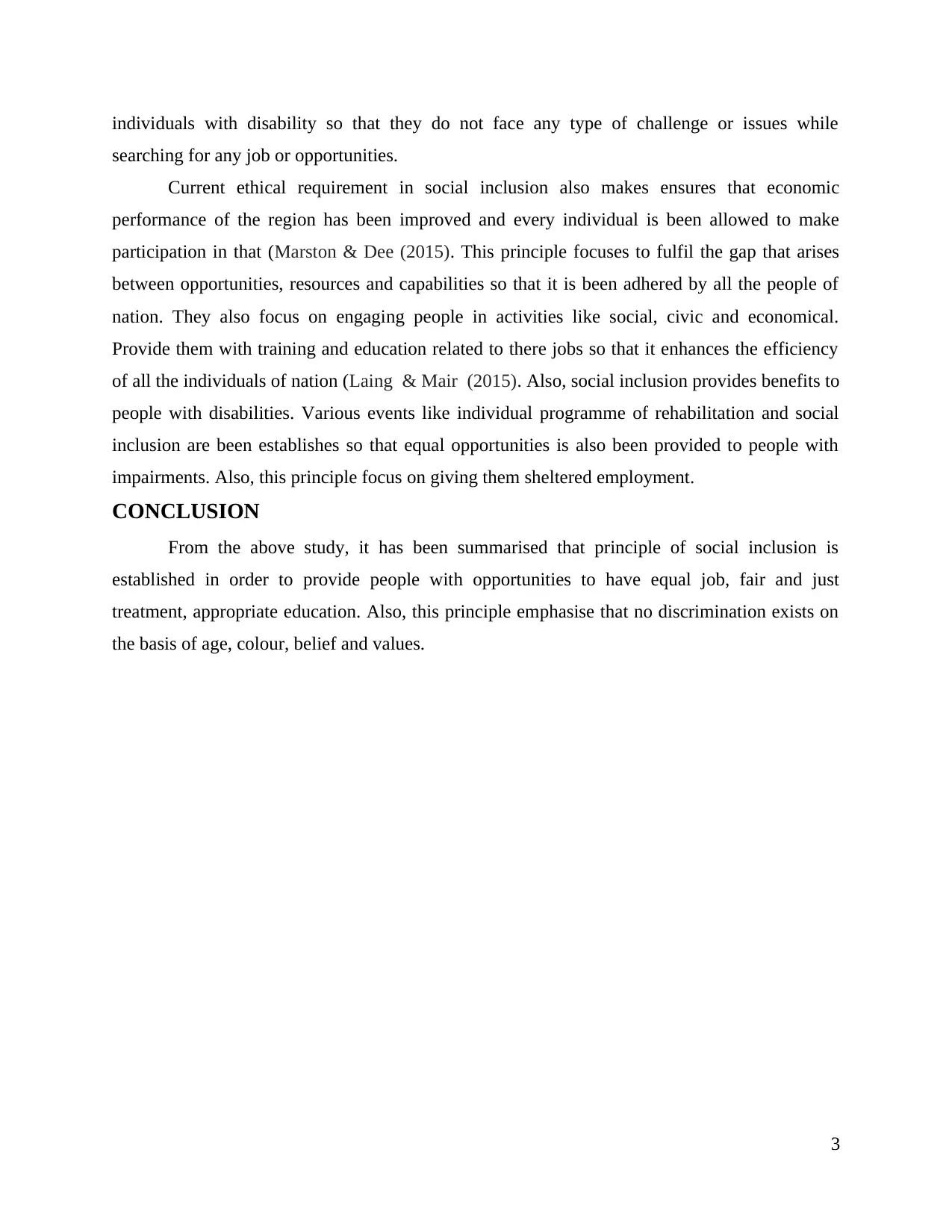
individuals with disability so that they do not face any type of challenge or issues while
searching for any job or opportunities.
Current ethical requirement in social inclusion also makes ensures that economic
performance of the region has been improved and every individual is been allowed to make
participation in that (Marston & Dee (2015). This principle focuses to fulfil the gap that arises
between opportunities, resources and capabilities so that it is been adhered by all the people of
nation. They also focus on engaging people in activities like social, civic and economical.
Provide them with training and education related to there jobs so that it enhances the efficiency
of all the individuals of nation (Laing & Mair (2015). Also, social inclusion provides benefits to
people with disabilities. Various events like individual programme of rehabilitation and social
inclusion are been establishes so that equal opportunities is also been provided to people with
impairments. Also, this principle focus on giving them sheltered employment.
CONCLUSION
From the above study, it has been summarised that principle of social inclusion is
established in order to provide people with opportunities to have equal job, fair and just
treatment, appropriate education. Also, this principle emphasise that no discrimination exists on
the basis of age, colour, belief and values.
3
searching for any job or opportunities.
Current ethical requirement in social inclusion also makes ensures that economic
performance of the region has been improved and every individual is been allowed to make
participation in that (Marston & Dee (2015). This principle focuses to fulfil the gap that arises
between opportunities, resources and capabilities so that it is been adhered by all the people of
nation. They also focus on engaging people in activities like social, civic and economical.
Provide them with training and education related to there jobs so that it enhances the efficiency
of all the individuals of nation (Laing & Mair (2015). Also, social inclusion provides benefits to
people with disabilities. Various events like individual programme of rehabilitation and social
inclusion are been establishes so that equal opportunities is also been provided to people with
impairments. Also, this principle focus on giving them sheltered employment.
CONCLUSION
From the above study, it has been summarised that principle of social inclusion is
established in order to provide people with opportunities to have equal job, fair and just
treatment, appropriate education. Also, this principle emphasise that no discrimination exists on
the basis of age, colour, belief and values.
3
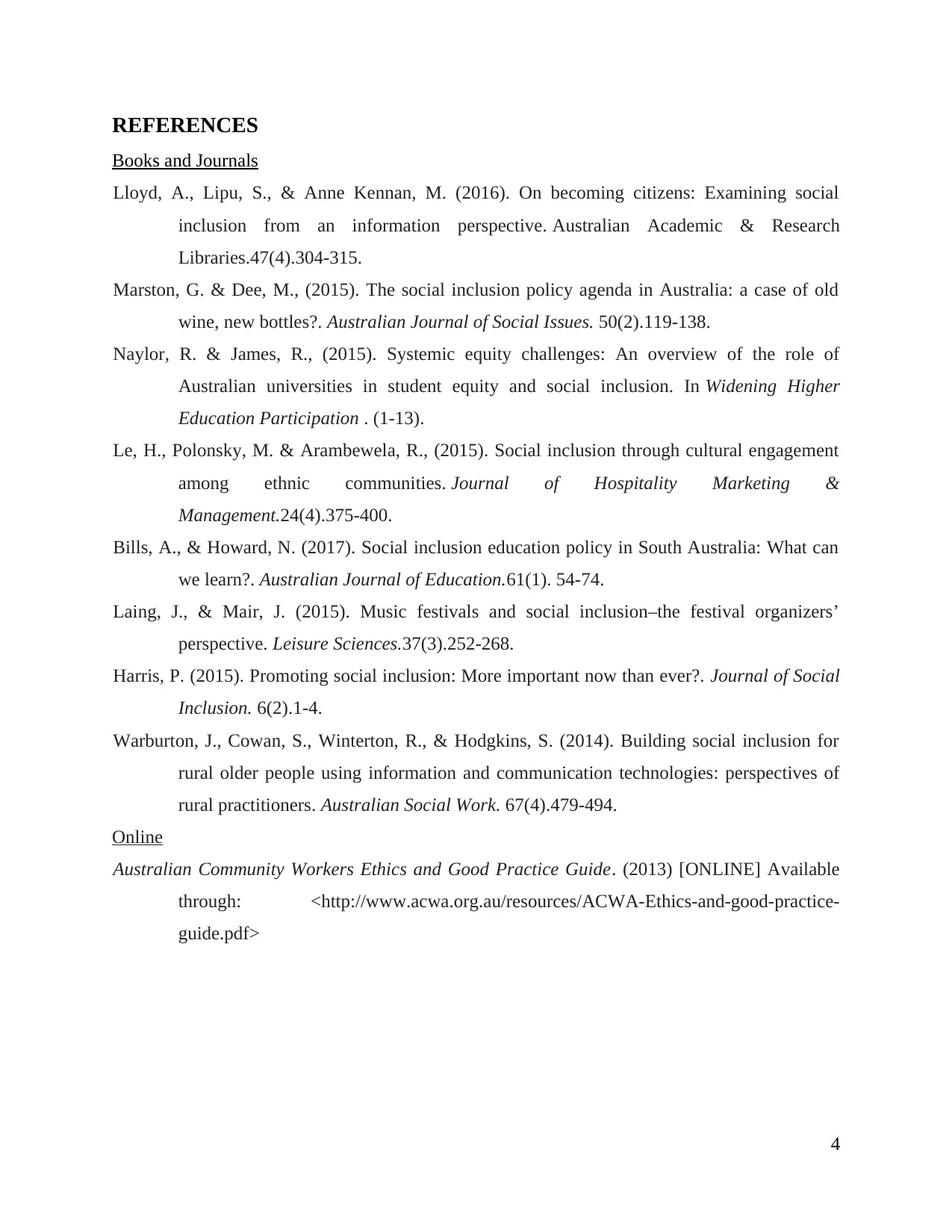
REFERENCES
Books and Journals
Lloyd, A., Lipu, S., & Anne Kennan, M. (2016). On becoming citizens: Examining social
inclusion from an information perspective. Australian Academic & Research
Libraries.47(4).304-315.
Marston, G. & Dee, M., (2015). The social inclusion policy agenda in Australia: a case of old
wine, new bottles?. Australian Journal of Social Issues. 50(2).119-138.
Naylor, R. & James, R., (2015). Systemic equity challenges: An overview of the role of
Australian universities in student equity and social inclusion. In Widening Higher
Education Participation . (1-13).
Le, H., Polonsky, M. & Arambewela, R., (2015). Social inclusion through cultural engagement
among ethnic communities. Journal of Hospitality Marketing &
Management.24(4).375-400.
Bills, A., & Howard, N. (2017). Social inclusion education policy in South Australia: What can
we learn?. Australian Journal of Education.61(1). 54-74.
Laing, J., & Mair, J. (2015). Music festivals and social inclusion–the festival organizers’
perspective. Leisure Sciences.37(3).252-268.
Harris, P. (2015). Promoting social inclusion: More important now than ever?. Journal of Social
Inclusion. 6(2).1-4.
Warburton, J., Cowan, S., Winterton, R., & Hodgkins, S. (2014). Building social inclusion for
rural older people using information and communication technologies: perspectives of
rural practitioners. Australian Social Work. 67(4).479-494.
Online
Australian Community Workers Ethics and Good Practice Guide. (2013) [ONLINE] Available
through: <http://www.acwa.org.au/resources/ACWA-Ethics-and-good-practice-
guide.pdf>
4
Books and Journals
Lloyd, A., Lipu, S., & Anne Kennan, M. (2016). On becoming citizens: Examining social
inclusion from an information perspective. Australian Academic & Research
Libraries.47(4).304-315.
Marston, G. & Dee, M., (2015). The social inclusion policy agenda in Australia: a case of old
wine, new bottles?. Australian Journal of Social Issues. 50(2).119-138.
Naylor, R. & James, R., (2015). Systemic equity challenges: An overview of the role of
Australian universities in student equity and social inclusion. In Widening Higher
Education Participation . (1-13).
Le, H., Polonsky, M. & Arambewela, R., (2015). Social inclusion through cultural engagement
among ethnic communities. Journal of Hospitality Marketing &
Management.24(4).375-400.
Bills, A., & Howard, N. (2017). Social inclusion education policy in South Australia: What can
we learn?. Australian Journal of Education.61(1). 54-74.
Laing, J., & Mair, J. (2015). Music festivals and social inclusion–the festival organizers’
perspective. Leisure Sciences.37(3).252-268.
Harris, P. (2015). Promoting social inclusion: More important now than ever?. Journal of Social
Inclusion. 6(2).1-4.
Warburton, J., Cowan, S., Winterton, R., & Hodgkins, S. (2014). Building social inclusion for
rural older people using information and communication technologies: perspectives of
rural practitioners. Australian Social Work. 67(4).479-494.
Online
Australian Community Workers Ethics and Good Practice Guide. (2013) [ONLINE] Available
through: <http://www.acwa.org.au/resources/ACWA-Ethics-and-good-practice-
guide.pdf>
4
⊘ This is a preview!⊘
Do you want full access?
Subscribe today to unlock all pages.

Trusted by 1+ million students worldwide
1 out of 6
Related Documents
Your All-in-One AI-Powered Toolkit for Academic Success.
+13062052269
info@desklib.com
Available 24*7 on WhatsApp / Email
![[object Object]](/_next/static/media/star-bottom.7253800d.svg)
Unlock your academic potential
Copyright © 2020–2026 A2Z Services. All Rights Reserved. Developed and managed by ZUCOL.





